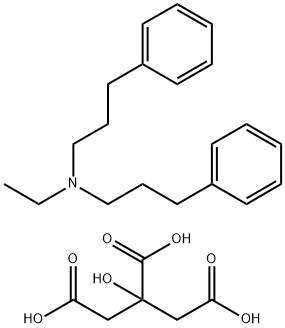Chemical Properties
White or almost white, crystalline powder.
Originator
Alverine citrate,Kemikos
Uses
An adrenergic-β3 receptor agonist. Antispasmodic.
Uses
Used for studies of pharmacological activity including:
- Synergism with fluconazole against Saccharomyces cerevisiae and Candida albicans
- Efficacy of combination with simeticone on abdominal pain associated with irritable bowel syndrome
- Nutrient-sensitized screening for drugs that shift energy metabolism from mitochondrial respiration to glycolysis
- Drug effects viewed from a signal transduction network perspective
- Enhanced cytotoxic effect of proteasome inhibitor MG132
- Mechanism of action on phasic smooth muscles
Definition
ChEBI: The citrate salt of alverine, resulting from the reaction of equimolar amounts of alvarine and citric acid. An antispasmodic that acts directly on intestinal and uterine smooth muscle, it is used in the treatment of irritable bowel syndrome.
Manufacturing Process
2 Methods of producing of alverine:
1. 3-Phenylpropylchloride reacted with ethylamine in the presence potassium
hydroxide and N-ethyl-3,3'-diphenyldipropylamine (alverine) was obtained.
2. 3-Phenylpropenal reacted with ethylamine in the presence hydrogen and Pt
as catalyst and BaSO4 and N-ethyl-3,3'-diphenyldipropylamine (alverine) was
obtained.
In practice it is usually used as citrate.
Therapeutic Function
Anticholinergic, Spasmolytic
References
[1] Patent: CN105461569, 2016, A. Location in patent: Paragraph 0023; 0049-0050
[2] Patent: CN103508898, 2016, B. Location in patent: Paragraph 0013; 0016; 0017



